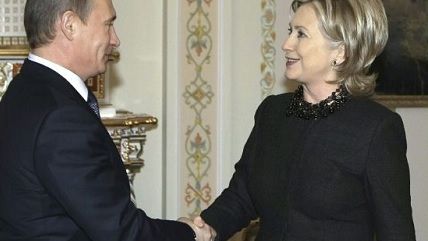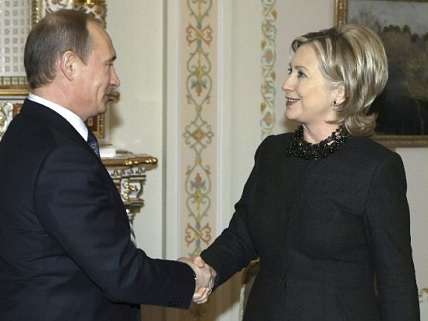Hillary Clinton's Disqualifying Comments on Russia
Using Aleppo to gain leverage over a geopolitical foe.


Of all the talk about the kind of comments that might disqualify someone from the presidency (Gary Johnson's Gary Johnson moments, anything controversial Donald Trump's said), Hillary Clinton easily made some of the most disqualifying comments last night, when she framed military intervention in response to the humanitarian crisis in Aleppo as an opportunity to create leverage to force Russia "to come to the negotiating table for a diplomatic resolution."
Clinton called for the U.S. to impose no-fly and safe zones in Syria, even while insisting she did not want ground troops in Syria (but conceding the use of special forces and enablers and trainers, as is already being done). "What is at stake here," Clinton argued, "is the ambitions and the aggressiveness of Russia. Russia has decided that it's all in, in Syria. And they've also decided who they want to see become president of the United States, too, and it's not me."
Clinton's saber-rattling is irresponsible given not just the kind of U.S.-Russia cooperation she mentioned she was part of (like nuclear weapons treaties and the Iran nuke deal), but some increased cooperation over Syria itself. Last month, the U.S. and Russia came to an agreement on coordinating airstrikes in Syria, but the ceasefire largely collapsed, with Russian and Syrian forces focusing on Aleppo, a primary of strong hold of anti-government forces. In the face of the bombings, advocates of more intervention warn U.S.-backed rebels are joining Al-Qaeda, one of the primary rebel groups in Aleppo being fought by the Syrian government. The U.S., and Hillary Clinton, insist Bashar Assad must be removed from power.
Last night Clinton insisted "children were suffering" because of Russian "aggression" in Syria. Russia has its only naval base with access to the Mediterranean in Syria, while the U.S. has articulated a more general "humanitarian," anti-Assad posture. Clinton explaining that U.S. military intervention in Syria was useful for the leverage it creates may have been the most honest thing she said at the debate.
Clinton also brought up the U.S. government's formal accusation that the Russian government directed hacking of organizations like the Democratic National Committee in an effort to influence the election. Wikileaks' Julian Assange has said his organization would release more election-related documents, and within an hour of the Washington Post releasing a story on a tape of Trump having a lewd conversation with Access Hollywood's Billy Bush released a trove of e-mails to and from John Podesta as well as transcripts of some of Clinton's paid Wall Street speeches, the authenticity of which she appeared to confirm last night.
At the debate, Trump again questioned whether Russia was behind the hacks. "I notice, anytime anything wrong happens," Trump explained, "they like to say the Russians are—she doesn't know if it's the Russians doing the hacking. Maybe there is no hacking, but they always blame Russia."
Trump also questioned the antagonistic approach to Russia. "I don't know Putin," Trump said, dismissing Clinton's references to his previous praise of the authoritarian, "I think it would be great if we got along with Russia because we could fight ISIS together, as an example. But I don't know Putin."
During the Republican convention, the removal of language supporting arming Ukraine in its conflict with Russia over Crimea, which Russia occupied and annexed after the pro-Russian government collapsed in the wake of street protests, was brought up as possible evidence of Russian influence on the Trump campaign and by extension the Republican Party. The top Trump staffer, Paul Manafort, previously worked as a lobbyist for the pro-Russian Ukraine government, and eventually left the campaign. Yet not arming forces in Ukraine is a good idea for the U.S.—it avoids an unnecessary military commitment and opportunity for escalation. Through the controversy, the fact that the Democratic platform didn't urge lethal aid for Ukraine either was largely missed, with Democrats choosing to take a hard right turn on Russia. Crimea is the location of Russia's only naval base with access to the Black Sea. Several important gas pipelines into Europe run from Russia through Ukraine.
The partisan posturing has come a long way from 2012, when Hillary Clinton's vaunted "reset" during President Obama's first term was used to dismiss concerns by Republican nominee Mitt Romney that Russia was America's greatest geopolitical foe. As I wrote then, while Romney was half-right about Russia (it's a geopolitical force that doesn't have to be a foe), the Obama administration was wrong about ignoring the differences between Russian and U.S. interests while seeking to insert itself into situations, like in Ukraine, where it has no clear interest. Now, the 2016 Democratic nominee is making an opposite kind of mistake, magnifying the differences between Russian and U.S. interests while ignoring potential cooperation on situations, like in Syria, in favor of using those situations specifically to antagonize Russia and build "leverage."
The idea that the U.S. has a significant role in places like Syria and Ukraine, and that it should project military force specifically to gain diplomatic advantage vis a vis other global powers in such crises is a dangerous evolution of an already aimless and destructive 21st century U.S. foreign policy.


Show Comments (78)